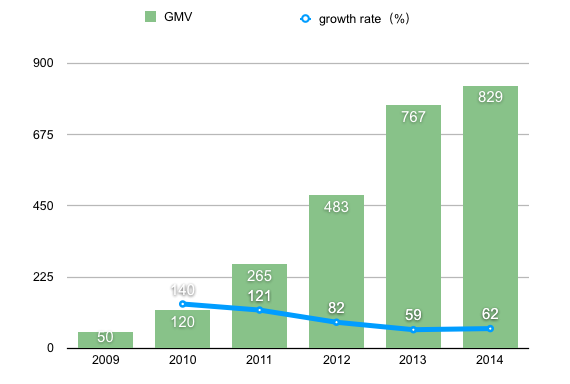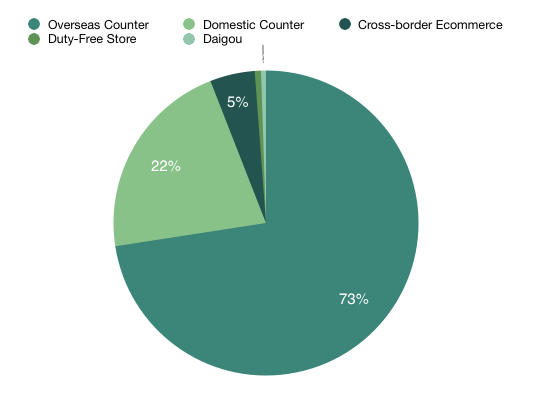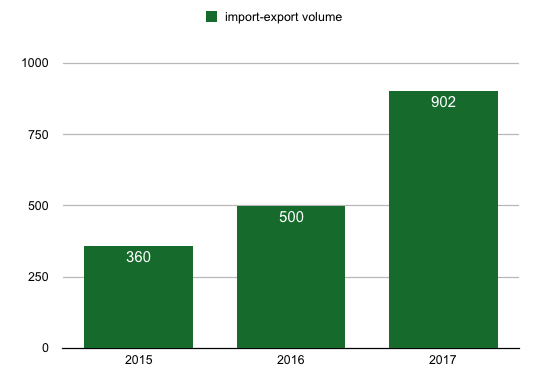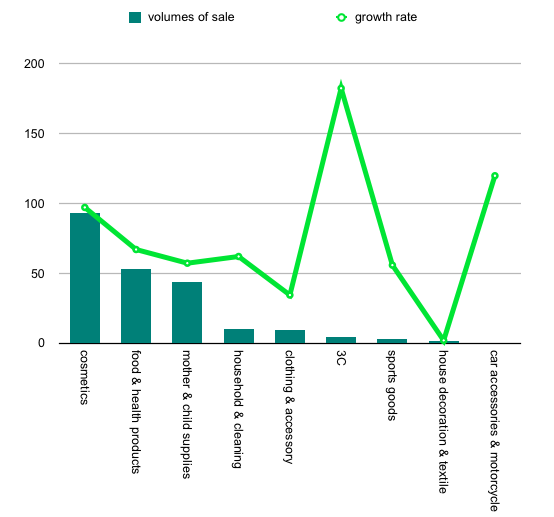Chinese Daigou: Known as overseas personal shopper, it’s a channel of commerce in which a person outside of China purchases commodities for a customer in mainland China (WIKIPEDIA).
Starting January 1st, 2019, with the official entry into force of the “Chinese E-commerce Law”, the ‘DAIGOU’ industry – which has a turnover of 100 billion yuan – will no longer exist. So, given this unfulfilled market potential, and the Chinese government’s further policy control on the e-commerce industry, how will Daigou agents, cross-border e-commerce platforms and overseas brands get their slice of this cake in this “reshuffle”?

With Daigou being very popular, cross-border consumption is now an upward trend
The term ‘Daigou’ originated around 2005 and was first used to call those overseas students and travelers who brought foreign goods back home for their families, and it was still a relatively niche market. The main reason was the high taxes applied by the Chinese government on foreign goods. However, since the outbreak of the “Sanlu Poisonous Milk Powder” incident in 2008, the trust of Chinese consumers towards Chinese brands dropped and the demand for foreign milk powder in particular, along with any kind of foreign goods in general, increased sharply. The ‘Overseas personal shopper’ officially became a profession, and gradually generated a large-scale, organized industrial chain. According to relevant data, from 2009 to 2014, the number of transactions increased by 16.58 times, from 5 billion to 82.9 billion Yuan.

After the year 2015, the transaction volume kept expanding at an annual growth rate of over 60%. Analysts estimate that in 2018 transactions from the Daigou market accounted for about 7% of the total e-commerce revenue in China.
However, not only Chinese consumers are keen to cross-border consumption: Pitney Bowes, a global e-commerce business solution provider, released a report on this topic, the “2018 Pitney Bowes Global E-commerce Study”. The report shows that the cross-border e-commerce market keeps growing everywhere and consumers’ cross-border consumption behavior is getting more and more frequent. In 2018 12% of consumers worldwide now shop at least once a week from vendors located abroad, at a frequency 10% higher than 2017.
According to the Fung Business Intelligence survey, Chinese consumers’ overseas spending reached US$313.8 billion in 2017, up 15% year-on-year, and is expected to exceed US$350 billion in 2018. The consumption of overseas products is generated from: overseas counters (products purchased abroad in general), cross-border e-commerce, duty-free shops, Daigou market, and domestic counters (imported goods purchased in China). Among them, the proportion of overseas counter purchases far exceeds other channels.

Since Daigou will disappear, cross-border e-commerce will face a bright future
On August 31st, 2018, the “E-Commerce Law of the People’s Republic of China” (hereinafter referred to as “E-Commerce Law”) was promulgated. The “E-Commerce Law” stipulates that starting January 1st, 2019, every Daigou businesses can only exist when the agents are in possession of a legal entity. This means that Daigouagents have to register in the Industry and Commerce Bureau – confirming themselves as e-commerce practitioners – apply for a business license in both the sourcing country and China, and pay taxes according to the law. This will eventually compress the Daigou business space, together with its benefits – to zero.
Chinese policies, on one hand, aim at limiting illegal shoppers; on the other hand, encourage the development of the legal cross-border e-commerce industry.

On November 30th, the Department of Finance issued the “Improvement of Cross-border E-Commerce Retail Import Supervision” notice. The notice clearly defines duties and obligations of cross-border e-commerce (in general), cross-border e-commerce platforms, domestic service providers and consumers. The notice – summarized in the following points – sounds like a friendly signal for cross-border e-commerce platforms and consumers.
- Esay Access to Cross-border E-commerce
Cross-border e-commerce retail imports are regulated by personal use of imported goods, reducing the difficulties to access the cross-border e-commerce market
- Expanded Pilot Cities
The range of cities to which the policy applies is expanded from 15 to 22,introducing new experimental cross-border e-commerce zones such as Beijing, Shenyang, Nanjing, Wuhan, Xi’an and Xiamen
- Merchandise Category expansion & quota increase
63 more items that are in high demand are listed as importable goods. The single transaction limit will be raised from the current 2,000 yuan to 5,000 yuan, and the annual transaction limit will be increased from the current 20,000 yuan per person per year to 26,000 yuan
Since this year, China has repeatedly lowered tariffs on imported goods. The most recent one was on November 1st, China lowered the import tariffs of 1,585 tax items. The average tax rate dropped from 10.5% to 7.8%, a drop of about 26%.
In 2017, the China Customs Cross-border E-commerce Management Office inspected and approved a total of 90.24 billion yuan traded goods (both imported and exported). 56.59 billion of which were imported, showing an increase of 120%. From January to October this year, the import value was 67.2 billion yuan, a year-on-year increase of 53.7%. China’s cross-border e-commerce retail import penetration rate (the ratio of the number of consumers buying goods through cross-border e-commerce to online shopping) has increased from 1.6% in 2014 to 10.2% in 2017.

It can be foreseen that the disappearing of Daigou will benefit cross-border e-commerce.
Chinese cross-border e-commerce market is highly centralized
The current Chinese cross-border e-commerce industry is basically stable. Tmall International, NetEase Kaola, JD Global, and Vipshop International have reached 75% of the total. The Industry giants have monopolized major markets.
The operating mode of mainstream players is divided into self-operated and platform types, which income generates by collecting profits from self-operated products or by collecting loyalty fees and commissions from merchants.
According to Tmall International, the three top categories of cross-border e-commerce sales in 2018 were: Cosmetics, Food & Health products, and Mother & Baby products, accounting for 86.8% of total sales.

While former Daigou agents’ only option to stay in the business is joining cross-border e-commenceplatforms, brands might want to setup their self-owned cross-border e-commerce channel
The recent policy shock, which includes limitations of the Daigou market, is forcing most of the Daigou agents to completely change their career. Although the new cross-border e-commerce law sets low entry barriers for these small merchants, only a small number of agents choose to transfer their business into cross-border e-commerce platforms.

On the other hand, brands have choice. Currently, most overseas brands choose to cooperate with e-commerce platforms when they first enter China, generating online sales through third-party agent operators. In 2016, for example, the vast majority of the 5,400 overseas brands that entered Tmall International, also entered the Chinese market for the first time. However, this trend seems to be about to change. E-commerce platforms are not always the ideal option for companies, and they’re indeed losing a large number of brands, for the following reasons:
- The more brands enter, the higher the cost of attracting traffic
- Only 10%-20% of brands are profitable
- Platforms charge sky-high commissions to brands
- Consumers’ data is owned by the agent operator, so there’s no way for brands to match and identify online and offline customers
In conclusion, brands should seize the opportunity of this rapid expansion of cross-border e-commerce, ideally by establishing an official brand-owned cross-border e-commerce channel (website.cn). Although managing their business from free trade zones (FTZs), brands have the chance to establish direct contact with
KEY TAKEAWAYS
- Daigou agents (or ‘Overseas personal shoppers’) are facing career changes or career transitions under the policy shock
- Cross-border e-commerce market continues to expand, industry giants monopolize the market
- Overseas brands should seize the opportunity to establish self-owned cross-border e-commerce channels

